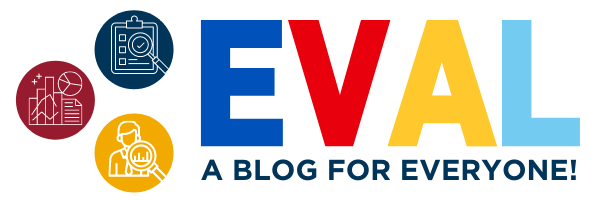Using Partner Interviews in Evaluation Practices

Using Partner Interviews in Evaluation Practices Framework
In the previous blog post Using Focus Groups in Education Research and Evaluation Practices we addressed the usage of qualitative data in educational evaluation practices, specifically described the focus group discussions as an effective way to inform the evaluation with the feedback from various project partners. To extend this conversation, this blog is focusing on the specifics of conducting partner interviews as another way to get more input from the partners.
What is the purpose of conducting interviews?
The main purpose of in-depth interviews is to find out what partners of GEAR UP or TRIO have experienced and what they think or feel about certain program services. Collecting information from multiple sources helps to better understand how the activities are being implemented and if we stay on track to achieve the program goals and objectives. Evaluators reach out to program partners to gain insights into their perspectives, perceptions, and reactions to the program activities as well as to seek their input on improving your program. Such conversations can shed light on the expectations the partners have and provide suggestions on how to modify or adjust activities if needed.
Who are the partners?
Any college access program involves several groups of people who are considered invested partners. Let’s look at the example of a 7-year-long GEAR UP grant. The GEAR UP partners are, of course, our students and their families who receive services. Further, we think of those who provide services. In our case, it will be the GEAR UP staff (director, coordinators, tutors, advisors, etc.). And lastly, those who are involved in GEAR UP services and have aninvestedinterest in its success. Here we include schoolteachers and administrators, school district staff, community members, and the general public. To learn more about figuring out who GEAR UP or TRIO partners are, check out our blog Who Shares in Your Success.
What to consider:
When selecting the candidates for your interviews think of those who can potentially contribute the most based on their level of involvement, ability to convey the information, and willingness to participate in the conversation. Typically, we conduct one-on-one interviews and audio (or sometimes video) record them because it is hard to take notes if there is only one interviewer. It is important to make sure that the people you invite feel comfortable and you have their permission to record the conversation.
It is imperative to think in advance if the way you select your candidates ensures that the data you collect will be accurate, your selection process is equitable, and your pool of individuals for interviews is representative.
- Accurate data means that the interview participants express what they really think and are not influenced by any authority or pressure of those who conduct interviews. The more flexible you are with the questions and accommodations the better your chances are to get reliable responses.
- Equitable selection of the candidates is insured by inviting demographically diverse individuals. We’re specifically referring to the selection process when you choose individuals from different racial and demographic groups to participate in interviews to help hear from the voices of various racial/ethnic, gender or other subgroups depending on the composition of your program partners.
- Representative groups will include people with diverse experiences to ensure that different perspectives are considered. Specifically for educational programs that might interview students, try to select students with different academic achievements, grade levels, participation history, etc.
How to structure:
The structure of an in-depth interview will depend on several factors:
- Time
- Think of how much time is most appropriate to allocate depending on the participant’s availability and the scope of your questions
- Try to make it short but still enough for a substantial conversation.
- Time of the day may have a difference in planning interviews.
- Age
- Elementary, middle, or high school students have different attention spans that you should always take into consideration.
- With younger children (or people with limited English proficiency) be sure to ask simple questions or rephrase if necessary.
- Topic
- Topics of the interview will also guide the structure of your interview. For example, if you want to get input on student or teacher perspectives of a specific activity you might have a more structured interview guide with a number of main questions. This will help to compare the responses.
- Partner characteristics
- Depending on the role of a partner you should think of what information you want to get and then decide if you want a more structured or less standardized format. Specifically, if you interview a school administrator you will use broader themes rather than questions to have a more meaningful conversation.
Conducting interviews is a challenging task that requires thorough preparation and organizational efforts, but it is a very powerful means of getting first-hand feedback on how your college access program is doing. Want to see what you can do with an interview? Check out how interviews from TRIO and GEAR UP programs have been turned into the CEOP Stories blog.

Contributed By Nadia Kardash
Nadzeya (Nadia) Kardash, Ph.D., is an Associate Researcher with the Research, Evaluation & Dissemination Department in the Center for Educational Opportunity Programs. She currently conducts research and evaluation of the CEOP’s federally funded college access programs including GEAR UP, TRIO, and other college access programs.
Follow @CEOPmedia on Twitter to learn more about how our Research, Evaluation, and Dissemination team leverages data and strategic dissemination to improve program outcomes while improving the visibility of college access programs.